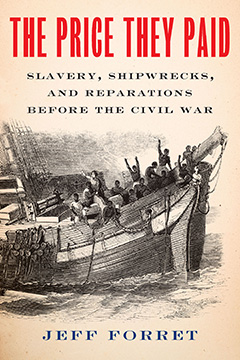The Price They Paid
A prizewinning historian uncovers one of the earliest instances of reparations in America—ironically, though perhaps not surprisingly, paid to slaveholders, not former slaves
“A spectacular achievement of historical research. Forret shows for the first time just how far the American government went to secure reparations.” —Robert Elder, author of Calhoun: American Heretic
In 1831, the American ship Comet, carrying 165 enslaved men, women, and children, crashed onto a coral reef in the Bahamas, then part of the British Empire. Shortly afterward, the Vice Admiralty Court in Nassau, over the outraged objections of the ship’s captain, set the rescued captives free. American slave owners and the companies who insured the liberated human cargo would spend years lobbying for reparations from Great Britain, not for the emancipated slaves, of course, but for the masters deprived of their human property.
In a work of profoundly relevant research and storytelling, historian and Frederick Douglass Prize–winner Jeff Forret uncovers how the Comet incident—as well as similar episodes that unfolded over the next decade—resulted in the British Crown making reparations payments to a U.S. government that strenuously represented slaveholder interests. Through a story that has never been fully explored, The Price They Paid shows how, unlike their former owners and insurers, neither the survivors of the Comet and other vessels, nor their descendants, have ever received reparations for the price they paid in their lives, labor, and suffering during slavery.
Any accounting of reparations today requires a fuller understanding of how the debts of slavery have been paid over time, and to whom. The Price They Paid represents a major step forward in that effort.
Praise
|
|


![Jeff Forret - Photo: [no credit needed; provided by the author] Jeff Forret - Photo: [no credit needed; provided by the author]](https://thenewpress.com/sites/default/files/styles/book_author_thumb/public/author_photos/forret_jeff.jpg?itok=_h7vHLtu)